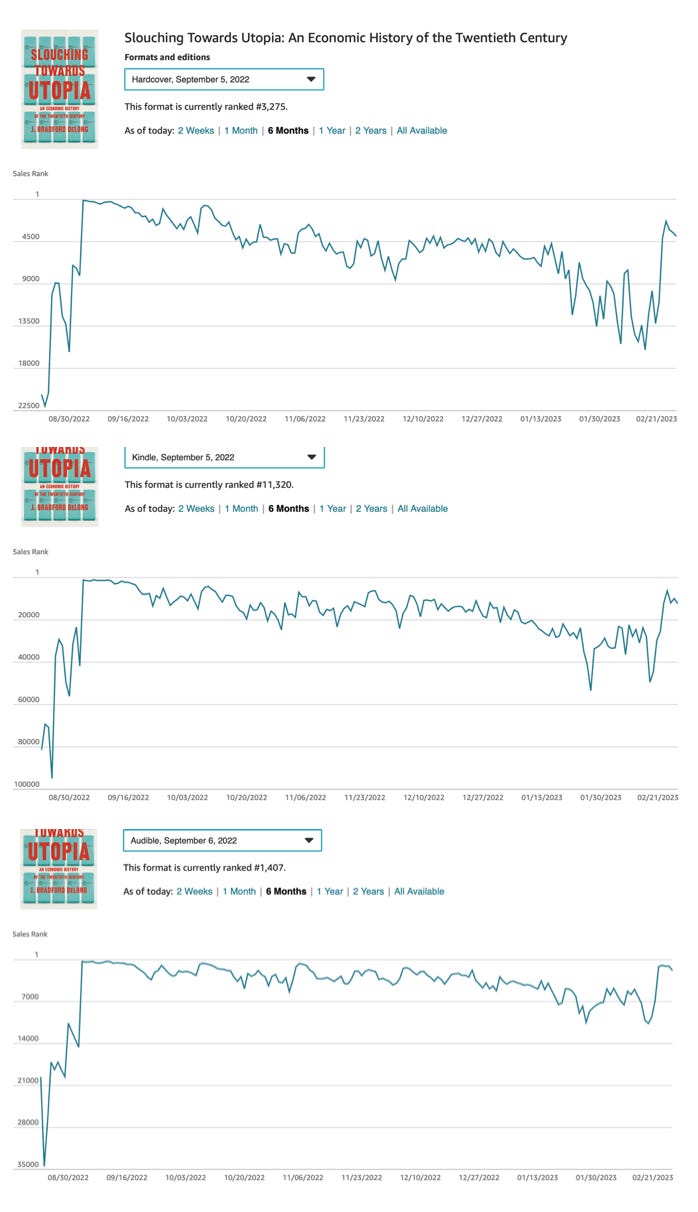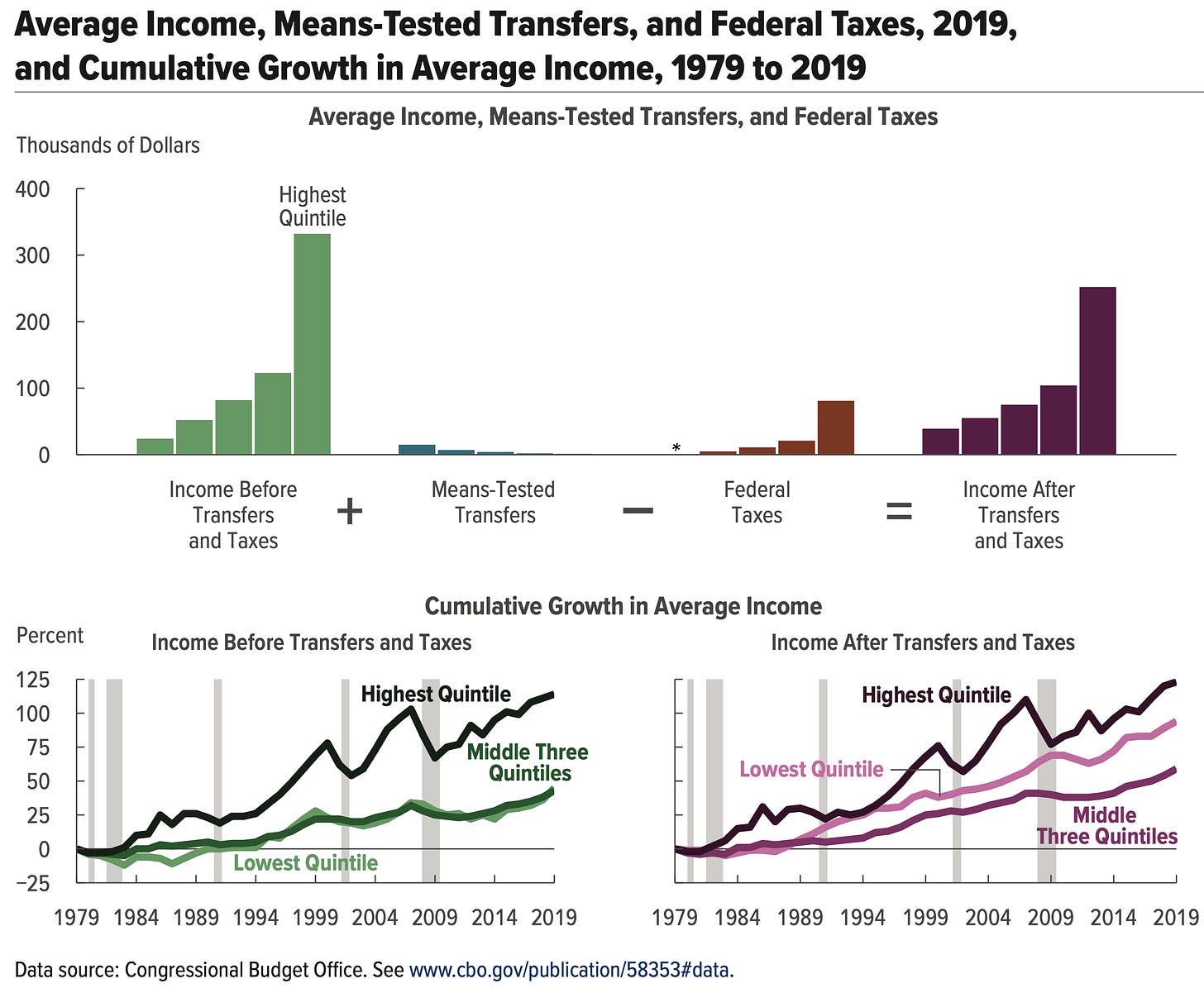"Slouching Towards Utopia" Sales Jump; & BRIEFLY NOTED: For 2023-02-24 Fr
I now credit Paul Krugman on the Ezra Klein show for the jump; American income distribution 1979-2019; Scott Aaronson finds Chat-GPT so amazing he cannot understand how anyone can anyone stop being...
SURPRISED! Slouching Towards Utopia Sales Jump
OK: what happened between February 12 and February 18 to push the book’s Amazon hardcover sales rank up to 2500 from 16000?
What did I miss that happened on the book-publicity front?
And how did I manage to miss it?
Yes, I know that this is only a jump from 25 to 170 all-format copies sold each day…
I now suspect it is Paul Krugman on the Ezra Klein show…
Ezra Klein: I guess a good place to end. So as our final question, what are the three books you’d recommend to the audience?
Paul Krugman: OK, so first off, Brad DeLong, my friend, an economist and historian, has this wonderful book called “Slouching Towards Utopia,” which is a history of what he calls the long 20th century. And if you just want to understand how the world changed from — he says that 1870 was the pivot point of history — you’ve got to read that book…
I had listened to Ezra Klein and Rachel Zoffnuss on pain. I had not yet listened to Ezra Klein and Paul Krugman…
ONE IMAGE: American Income Distribution Changes 1979-2019:
MUST-READ: Scott Aaronson on Chat-GPT:
Scott Aaronson: Should GPT exist?: ‘Some are angry that “Sydney” has now been lobotomized… to try to make it stick to the role of friendly robotic search assistant rather than, like, anguished emo teenager trapped in the Matrix. Others are angry that Sydney isn’t being lobotomized enough. Some are angry that GPT’s intelligence is being overstated… hyped up, when in reality it’s merely a “stochastic parrot,” a glorified autocomplete… that lacks any model of reality outside streams of text. Others are angry instead that GPT’s growing intelligence isn’t being sufficiently respected and feared.
Mostly my reaction has been: how can anyone stop being fascinated for long enough to be angry?… For a million years, there’s been one type of entity on earth capable of intelligent conversation: primates of the genus Homo…. Now there’s a second type of conversing entity. An alien has awoken—admittedly, an alien of our own fashioning, a golem, more the embodied spirit of all the words on the Internet than a coherent self with independent goals. How could our eyes not pop with eagerness?… If the alien sometimes struggles with arithmetic or logic puzzles, if its eerie flashes of brilliance are intermixed with stupidity, hallucinations, and misplaced confidence … well then, all the more interesting! Could the alien ever cross the line into sentience, to feeling anger and jealousy and infatuation and the rest rather than just convincingly play-acting them? Who knows? And suppose not: is a p-zombie, shambling out of the philosophy seminar room into actual existence, any less fascinating?…
Very Briefly Noted:
The Century Foundation: A 2023 Plan for Economic Equity and Progress
Martin Sandbu: ‘If you want peace, double down on (economic) war…
Jesus Rodriguez & Ksenia Semenova: Inside BLOOM: How Thousands of AI Researchers Created an Open Source ChatGPT Alternative: ‘Over 1200 participants from 38 countries, including experts in machine learning, computer science, linguistics, statistics, socio-cultural anthropology, philosophy, law, and other fields, registered with BigScie Science and were given access to its communication channels.
Hugo Mercier & Dan Sperber: The Enigma of Reason…
Mark Kelly: The Karass According to Vonnegut…
Ezra Klein & Paul Krugman: The Inflation Story Has Changed Significantly. Paul Krugman Breaks It Down…
Christopher D. Carroll & al.: Does Cultural Origin Affect Saving Behavior? Evidence from Immigrants: ‘Why are there such large differences in saving rates across countries?… Some economists have also considered the possibility that saving differ- ences stem at least partly from cultural rather than strictly economic differences across countries…
Christopher D. Carroll & al.: Are There Cultural Effects on Saving? Some Cross-Sectional Evidence: This paper tests the hypothesis that cultural factors influence saving by comparing saving patterns of immigrants to Canada from different cultures. Using data from the Canadian Survey of Family Expenditures, we find no evidence of cultural effects on saving…
Jason Crawford: Can submarines swim? (In which I demystify artificial intelligence): ‘Once it looks at more than a handful of words… any sequence… would almost certainly be unique...
Ezra Klein: How Barnes & Noble Came Back From Near Death: ‘“How is it that bookstores do justify themselves in the age of Amazon?” James Daunt, the chief executive of Barnes & Noble, asked during the Book Industry Study Group’s 2020 keynote address. “They do so by being places in which you discover books with an enjoyment, with a pleasure, with a serendipity that is simply impossible to replicate online. And to do that, you have to have a good bookstore”…
Stata: Video tutorials…
Ed Luce: Jimmy Carter has been wronged by history: ‘Ronald Reagan, meanwhile, benefits from an eternal free pass…
Zeynep Tufekci: ‘Vaccines save lives. Also: the lines converged. This isn't possible if infections don't confer immunity—but the price is those earlier excess deaths and more severe illness. Vaccines work…



Kevin Systrom: ‘Excited to announce @ARTIFACT_News is now open to everyone…


Tom Frieden: ‘Masks have been an effective tool throughout the Covid pandemic, despite erroneous claims to the contrary…
¶s:
Brian Deese: Remarks on a Modern American Industrial Strategy: ‘Alexander Hamilton prepared a series of reports to Congress that laid the intellectual foundations for the young American economy…. That imperative has a contested history in American economic policy. For much of the last half-century, even uttering the words “industrial policy” was met with something between derision and concern. But our economy has changed, and the world has changed, too. My core point today is this: it is a critical and urgent imperative for the United States to chart and implement a modern American industrial strategy. Properly conceived and implemented, an industrial strategy is an economic resilience and capacity strategy. Investments in our industrial capacity will leave our economy better positioned to weather future shocks—and to help all Americans thrive…
Jake Sherman and John Bresnahan: Party Leaders: ‘We’re going to spend a lot more time on McCarthy today because, to be honest, Jeffries has a much easier path right now. The New York Democrat has the unanimous support of his caucus, has built out a new staff and is raising impressive gobs of money. House Democrats will follow the lead of President Joe Biden while trying to figure out how to pick up the five seats they need to get back in the majority. McCarthy, on the other hand, is the speaker and the buck stops with him on every issue…. McCarthy has given Fox News’ Tucker Carlson access to more than 40,000 hours of internal surveillance footage from the Jan. 6 insurrection…. We don’t entirely understand why McCarthy wants to keep Jan. 6 in the news; most Americans understand that GOP-aligned extremists sought to overturn the election at former President Donald Trump’s urging. But McCarthy said he “promised”…. McCarthy’s handling of the scandal surrounding Rep. George Santos (R-N.Y.)… has been confusing…. The speaker will have to figure out how to pass a budget resolution…. Debt limit…. Relationship building. McCarthy and Jeffries have had good interactions so far…
Karl Marx (1873): Capital Vol. I - 1873 Afterword [Abstract: ‘As I was working at the first volume… the peevish, arrogant, mediocre ‘Epigonoi who now talk large in cultured Germany… treat[ed] Hegel in same way as the brave Moses Mendelssohn in Lessing’s time treated Spinoza, i.e., as a “dead dog.” I therefore openly avowed myself the pupil of that mighty thinker, and even here and there, in the chapter on the theory of value, coquetted with the modes of expression peculiar to him. The mystification which dialectic suffers in Hegel’s hands, by no means prevents him from being the first to present its general form of working in a comprehensive and conscious manner. With him it is standing on its head. It must be turned right side up again, if you would discover the rational kernel within the mystical shell…
Michael Bérubé (2005): On the production of fresh wingnuts: ‘I thought the far left’s knee-jerk response to 9/11 was a knee-jerk response myself…. But my differences with the far left on that score did not lead me to abandon the American left that fought for the minimum wage, the eight-hour day, the weekend, Social Security, the Civil Rights Act, the Occupational Safety and Health Administration, the Clean Air and Water Acts, unemployment insurance, reproductive rights, gay rights, and universal, single-payer health care. By contrast, when the Charles Johnsons, James Lilekses, Tammy Bruces, and Roger Simons of the blogosphere parted ways with liberalism, they not only pledged allegiance to Bush; they also adopted all manner of traditional wingnut obsessions that predate 9/11 by decades… the War on Terror and the firmness of Dear Leader… Jane Fonda (!) and Dan Rather (!!) and the New York Times and the whole MSM and the United Nations (!!!) and Jimmy Carter and the Clenis® (!!!!!) and Teddy Kennedy and the French…. It’s like, “Everything changed for me on September 11. I used to consider myself a Democrat, but thanks to 9/11, I’m outraged by Chappaquiddick”… e-mailed a Wingnut Software Package that allowed them to download every major wingnut meme propagated over the past thirty years…









Deese: Lots of nice sounding words like "resiliency" but It is very hard to see exactly what policies he has in mind that are different from just promoting growth.
Krugman gave a good reason for paying more attention to wages than just any old collection of P*Q equaling the same V.
Still I thought he failed to explaining inflation as a necessary mechanism to allow relative prices to adjust when some (especially but not exclusively wages) adjust up and down asymmetrically. This left him to appear to justify an inflation target as mechanism to allow central banks to avoid the ZLB for short-erm interest rates. Inflation needs to be managed as an income-maximizing tool for keeping the economic resources fully employed in the face of supply and demand side shocks.